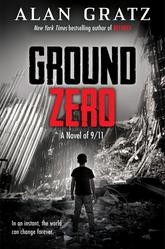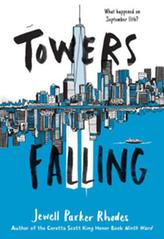
|

|
We invited authors Allan Gratz and Jewell Parker Rhodes to discuss their middle-grade novels about the September 11, 2001, attacks: Rhodes's Towers Falling (Little, Brown), published in 2016, and Gratz's Ground Zero (Scholastic), published earlier this month.
Alan Gratz is the author of several books for young readers, including Allies, Grenade, Refugee, Projekt 1065, Prisoner B-3087 and Code of Honor. He lives in North Carolina.
Jewell Parker Rhodes is the author of Ghost Boys, Black Brother, Black Brother, Ninth Ward (a Coretta Scott King Honor book), Sugar (winner of the Jane Addams Peace Association book award) and Bayou Magic. She has also written many books for adults. She lives in Seattle, Wash.
Alan Gratz: Towers Falling is a powerful tool, which educators can use to introduce the idea of 9/11 to students born after the fact. Was that part of the decision to set your story in a classroom, 15 years after 9/11?
Jewell Parker Rhodes: Throughout my youth-writing career, I've purposefully written for kids and their teachers. Teachers, in my view, amplify a good book. My approach was sealed when the principal, librarian and teachers of the Brooklyn New School, P.S. 146, opened their community to me and shared with me their trauma from watching the attack on the Towers unfold across the river. My novel primarily takes place during a school semester, focusing on one major protagonist--Deja, who's Black and homeless because of her father's PTSD as a 9/11 survivor--and her friends: Sabeen, a Turkish-American Muslim girl, and Ben, a Jewish boy whose dad has had multiple deployments and whose parents are divorcing.

|
|
| Jewell Parker Rhodes (photo: Jay Watson) |
|
With my characters I was really trying to capture the sense of community and friendship, trying to show how diversity is America's strength. The novel very much encourages respect for our founding documents (which, though imperfect, promote social justice) and our historic pro-immigration and anti-discrimination stance. Deja's character allowed me to show the lingering effects of 9/11 and how her father's PTSD as a Twin Towers employee led to the family's economic downfall. Sabeen allows me to explore how the majority of Muslims are not terrorists. Yet, faith and colorism mark them for continuing prejudice. Ben represents all the military children who've also had to sacrifice and be resilient post 9/11.
Your wonderful novel, Ground Zero, alternates between two major characters and two locations, separated by 20 years. It's a complex survival story with graphic descriptions from inside a tower and in an Afghan village. Without giving away too much, can you say more about your artistic approach?
Gratz: The story of 9/11 is very important, and one that young readers want to read. But the message at the end of that day was, "Muslim terrorists are coming to kill us!" And while that was true that day, it hasn't been true for most of the intervening 20 years. We've had 20 years to put that day into perspective, and I wanted to find a way to show that perspective in the novel.
.jpg) |
|
| Alan Gratz (photo: Wes Stitt) |
|
So Ground Zero became the story of two different kids. The first is a boy named Brandon, who is in the North Tower of the World Trade Center on 9/11 and has to find a way to survive when an airplane slams into the building just a few floors above him. The other character is Reshmina, a girl who experiences her own version of 9/11 when her village in Afghanistan becomes a battleground between the United States and the Taliban on September 11, 2019. As I did in Refugee, I find a way to show not just the parallels in those different times, places and stories, but also how the characters are directly connected across time and space. That global, timeless connection is becoming a recurring theme in my work--the idea that we're all of us in this together, and always have been.
Rhodes: When Towers Falling was published, a few people took me to task for "showing" 9/11 trauma on a computer screen while Deja imagines the suffering. Your novel was published five years after mine. Do you think the passage of time and/or your own artistic sensibility allows you to be more vivid?
Gratz: I get pushback, too. The pushback is always from adults, though, not kids. Young readers are desperate to know the truth about difficult, dangerous situations--refugee crises, the Holocaust, 9/11. As adults, we often want to shelter kids and maintain their innocence for as long as possible. I get that. I don't want to drop the weight of the world on young readers' shoulders. But I think a lot of adults forget--or just don't understand--that young readers want to read books that deal with difficult subjects because those difficult subjects have come to them first. They are shaping their views of the larger world right now because the world is forcing them to. And books are a terrific place to do that.
Rhodes: Yes. Like you, I conceive of my novels as "safe places" for kids to discuss ideas and current events with teachers, librarians and parents. Patronizing kids leaves them underprepared to become good citizens.
Gratz: I agree. So, yes, my intention right from the very start was to put my two protagonists right in the middle of the trouble. Has the passage of time given me more license? Perhaps. The past five years since your Towers Falling came out have certainly seen issues of racism, social justice, climate change, pandemics, domestic terrorism and more come to the fore, and though middle schoolers may not be reading the newspaper or watching the news, they see it all. They hear it all. We all do. Perhaps as our country has become more politically charged, our overall tolerance for more direct, more vivid accounts of events has risen too. Because we realize we can't bury our heads in the sand about any of this any longer.

